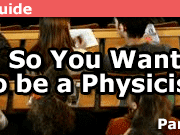First years of Graduate School from Being a TA to the Graduate Exams
Full Chapter List - So You Want To Be A Physicist... Series
Part I: Early Physics Education in High schools
Part II: Surviving the First Year of College
Part III: Mathematical Preparations
Part IV: The Life of a Physics Major
Part V: Applying for Graduate School
Part VI: What to Expect from Graduate School Before You Get There
Part VII: The US Graduate School System
Part VIII: Alternative Careers for a Physics Grad
Part VIIIa: Entering Physics Graduate School From Another Major
Part IX: First years of Graduate School from Being a TA to the Graduate Exams
Part X: Choosing a Research area and an advisor
Part XI: Initiating Research Work
Part XII: Research work and The Lab Book
Part XIII: Publishing in a Physics Journal
Part XIV: Oral Presentations
Part XIII: Publishing in a Physics Journal (Addendum)
Part XIV: Oral Presentations – Addendum
Part XV – Writing Your Doctoral Thesis/Desertation
Part XVI – Your Thesis Defense
Part XVII – Getting a Job!
Part XVIII – Postdoctoral Position
Part XIX – Your Curriculum Vitae
You are now entering your first year of graduate school. In terms of the academic aspect, you will have a set of required courses that you must take. Typically, these courses would be advanced classical mechanics (at the level of Goldstein), advanced QM (at the level of Merzbacher and Sakurai), and advanced E&M (at the level of Jackson or Landau-Lifschitz). Some or all of these classes may cover more than a semester or quarter. No matter what you intend to specialize in later on in your graduate studies, these are courses that all physics graduate students must take. So plan on spending maybe the first 2 years of your graduate life taking your required and optional classes. This should also give you the opportunity to get to know the various faculty members, the specific types of research work being done at the school, the faculty members who have the money to support graduate research assistants, people you want to avoid like a plague, etc. These are all intangibles that you can only find out once you are there and experiencing the system.
Take note that in the majority of graduate programs, you do not have to enroll in as many credits hours per semester as you were required as an undergraduate. Most schools have lower minimum credit hours for graduate students than undergraduates, some even have no minimum. So you can take one, two, or even just three classes per semester. This is especially helpful if you are also a teaching assistant and have to put in some hours per week doing your responsibility. However, keep in mind also that in most schools, graduate students are expected to attain higher grades than undergraduates in all their classes. Typically, anything below a B is a failure (this varies from school to school, so double-check!). So you cannot get below some minimum grades (not just an F) to maintain a passing mark.
If you are lucky enough to receive a teaching assistantship, then you will be assigned duties to certain faculty members. This may include running physics undergraduate laboratories, grading homework/tests, or even conducting a discussion/tutorial session. Many graduate students tend to look at these as a chore, but permit me to give you one important piece of advice. You have NOT understood a material UNTIL you are able to teach it effectively to another person. I will say without hesitation that my experience in being a TA has been nothing but a completely wonderful learning experience FOR ME. You quickly realize that if you want to do a good job (rather than a mediocre one), you have to be meticulous in how you to present things to the students who are about to learn the material. Even grading homework solutions can be a challenge sometimes, especially when you have a bunch of very intelligent students who can sometimes offer a rather different approach to answering a question. My philosophy in approaching my TA duties had always been ”if I have to do this, I might as well do it as well as I can”. I think if you have pride in yourself and your ability, you’d never want to produce a half-baked piece of work. This, I believe, is the only way to not only fulfill your responsibility for what they hire you for but for you to also get as much out of it as possible. Besides, you CAN add this to your resume later on!
But now, we come to the BIG MONSTER that is looming in your future: the dreaded qualifying examination.
First of all, what the hell is it? It is an exam given by the physics department of your school, to test if you have the basic, fundamental physics knowledge to be able to complete the program. So these tests are highly ”school-dependent”, and thus, can vary in scope, nature, procedure, length, etc. Typically, the exam is offered once a year, and a Ph.D. candidate has the opportunity to pass it by the end of his/her 2nd year of graduate studies. Failure to pass it by then will prevent the candidate from continuing (a polite way of saying ”You have to leave and can’t come back!”). This is why many research groups would not want you working for them till you pass this thing, because they can’t be sure that you won’t just disappear.
Secondly, what is involved in such an exam? Again, this varies quite a bit from school to school. Based on my observation, the qualifying exam can go from one big exam in a single day, to an exam spread over 2 days, to something that goes on for 5 consecutive days! I have seen schools having separate days for different subject areas in physics: Day One – Classical Mechanics, Day Two – E&M, Day Three – QM, etc.. I’ve seen graduate exams in which if you pass CM and E&M, but fail QM that year, then the following year, you only need to retake the QM part of the exam, while others make you retake the whole thing. And get this, in some schools, the written part is only HALF of the exam – there could be an oral part of the qualifying exam where you are asked various questions and have to respond verbally and work out your answer on the board. I’ve seen schools that use such oral exams for students with borderline pass/fail results to see if they have a higher ability than what is reflected in their exam scores.
Thirdly, what is covered in the exam? A simple answer: everything that was taught to you at the undergraduate level in a typical physics curriculum. Because of this, it is often that a graduate student enrolls in an advanced undergraduate class or two during their 1st year of graduate studies just to get up to speed with areas that he/she is weak in. So you do have a limited time to shore up your weak points. In some schools, especially the highly competitive ones, even the 1st year graduate material is included in the qualifying exam. So again, the scope and difficulties of the exam content can vary from school to school. But what is common is that you MUST know your undergraduate CM, E&M, and QM without fail! This is a given. You should also know very well Thermodynamics and Statistical Mechanics. Some exams allow you the option to choose more specific areas such as particle physics, solid-state physics, nuclear physics, atomic physics, etc. I have also seen a qualifying exam that, essentially, tests you on your ”historical” knowledge. A question lists a number of important experiments in physics, and you are asked to pick… oh, 3 or 4, and write down what it is, and why it was such an important experiment. So the moral of the story is, almost everything and the kitchen sink, can be in one of these exams.
Fourth, how does one prepare for it? As I’ve said above, some students retake a few undergraduate classes as preparation. However, the most effective way for you to prepare for such an exam at your particular school is to ask for copies of previous qualifying exams. The department usually keeps a record of old exams (if they don’t, they should!). If not, ask the elder graduate students. Unless they take back the exam questions, the more advanced graduate students should have copies of the exam they sat for. Now work through them. It may be useful to work in groups so that you all can agree on what the correct solution is. There may be also books that publish old qualifying exam questions – I’ve seen one for Princeton (with answers!). What this will do is give you a flavor of the kinds of questions and the level of knowledge that you are expected to have. But here’s a warning: the qualifying exam committee changes every year. So do NOT be surprised if you get blindsided and the exam looks nowhere near what it looked like in previous years. It totally depends on who is on the committee and what they wish to ask. This is where having an eccentric faculty member in the exam committee is not to your advantage.
Fifth, how do they determine who passes and who doesn’t? From what I’ve seen, schools have done both curving the results or have a fixed exam score as the passing mark. However, this is only a guess on my part, because most schools do not tell you beforehand (or even after) how this is done. Sometimes this even changes from year to year. I have only heard unofficial remarks on how the cut-off was set. So I have no inside information on this one…. yet!
Finally, the worse thing you can do to yourself is worrying yourself to death! Granted, this is probably the biggest obstacle you will ever face in your graduate studies. However, people DO pass the exam, ordinary people like you and me, and not superhuman geniuses. What you need to do is focus your life on the exam, devise a systematic study approach, and cover the things that you know that you must know cold. Again, get a study partner who is in the same boat as you are. Split the exam questions so that you two can cover a larger scope, and discuss the solution. I think most students who passed the qualifying exam did this (I certainly did). And try not to lose your sanity. Get enough sleep, eat properly, and take care of your health. You (both your mind and your body) will need to be at your best when you enter the examination hall.
PhD Physics
Accelerator physics, photocathodes, field-enhancement. tunneling spectroscopy, superconductivity








You betcha!
Zz.
ZapperZ, thanks for an awesome Insights post. It was very interesting reading.